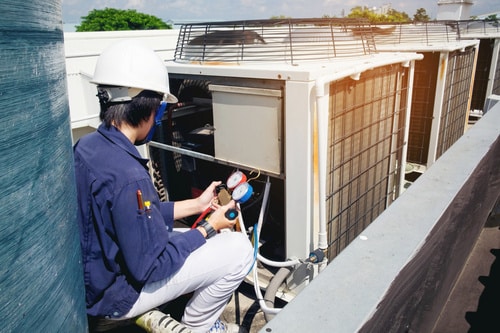
- ai field service management
- fsm
- HVAC
- Mobile App
Why is mobile field service software for HVAC essential in 2025? Your Complete Guide
Key Takeaways:
Here’s a quick overview of why mobile field service software is essential for HVAC businesses in 2025:
- Mobile HVAC software enhances technician efficiency by providing real-time updates, intelligent scheduling, and on-the-go access to job information.
- It improves customer satisfaction through quicker booking of appointments, tracking of services, and immediate digital invoicing.
- The route optimization, improved resource allocation, and reduced administrative workload all contribute to lower operational costs.
- The first-time fix rates are also enhanced because technicians can access inventory information, service history, and diagnostic tools on-site.
- HVAC companies have high ROI in the long term due to better workflow, more job volume, and customer retention.
The HVAC industry is experiencing rapid change due to rising customer demands, stricter rules, and expanding market competition. By 2025, businesses that maintain outdated operational methods will face difficulties adapting to the rapid requirements of modern service management. Manual dispatch, scheduling, and communication result in revenue loss and unhappy clients.
To stay competitive, HVAC companies must leverage digital solutions that streamline operations and improve customer satisfaction. This is where mobile field service software for HVAC becomes a game-changer. Organizations implementing sophisticated digital solutions achieve maximum HVAC field service technician efficiency while improving appointment precision and service delivery quality.
Praxedo, a leader in field service software for HVAC companies, understands the industry’s unique challenges. With an efficient HVAC field service app, businesses can transform their workflow, reduce costs, and increase efficiency. In this article, we explore why HVAC businesses must adopt HVAC field service software with mobile apps to remain competitive in 2025.
What Challenges Do HVAC Teams Face Without Mobile Software?
Inefficiencies in Scheduling and Dispatch
The scheduling process through phone calls, spreadsheets, and manual coordination produces scheduling conflicts, missed appointments, and extended response times. Without HVAC field service dispatch software, businesses struggle to assign jobs efficiently, resulting in unnecessary delays and customer dissatisfaction.
With mobile field service software for HVAC companies, dispatchers can instantly assign tasks based on technician availability, skill set, and location. The system provides immediate updates that help field teams acquire their assignments quickly, resulting in fast service delivery and improved customer loyalty.
Limited Technician Visibility and Communication Gaps
Without a robust HVAC field service app, managers lack real-time visibility into technician locations and job progress. The lack of visibility between office and field teams creates inefficient routing, higher fuel costs, and delayed communication.
By integrating commercial HVAC field service software, companies can track technician movements, monitor job completion times, and provide instant updates. The real-time connection between dispatchers and HVAC field service technicians enables them to handle unexpected changes, which results in better operational efficiency.
Paper-Based Workflows and Delayed Reporting
Most HVAC businesses use paper invoices, work orders, and service reports. The traditional paper-based workflow system causes delays and administrative problems while producing billing errors. The absence of automation also causes payment processing delays, resulting in reduced business profitability.
With an HVAC field service mobile app, technicians can generate digital reports, capture customer signatures, and submit invoices immediately after job completion. The accelerated payment cycle and reduced paperwork improve business focus on service quality.
How Does Mobile HVAC Software Improve Dispatch and Scheduling?

Automated Job Assignments and Smart Scheduling
Businesses can automate job assignments using HVAC field service dispatch software based on technician expertise, location, and urgency. The smart scheduling system minimizes unproductive periods while optimizing workforce productivity to handle urgent jobs first. According to a study, more than 80% of field service technicians believe that mobile apps and software are essential for efficiency and optimal customer service. (LLCBuddy)
Real-Time GPS Tracking and Route Optimization
One of the biggest advantages of HVAC field service software with a mobile app is real-time GPS tracking. The tracking system enables dispatchers to check technician locations while creating better travel paths, which decreases fuel costs. The system allows for faster response times and reduces operational costs.
Seamless Communication Between Teams
An effective HVAC field service app enables instant messaging between technicians and dispatchers. The software also allows instant communication between stakeholders to share last-minute job updates, customer requests, and emergency repair information, which helps all parties to stay informed and work efficiently.
How Can Mobile Software Maximize Technician Productivity for HVAC Teams?
Access to Work Orders Anytime, Anywhere
With mobile field service software for HVAC, technicians can access work orders, customer history, and service manuals directly from their devices. The system provides technicians with essential information, eliminating their need to visit the office and enabling them to work efficiently.
Instant Digital Reports and Customer Signatures
The software can create real-time service reports, which technicians can use to capture electronic signatures and immediately send job completion details. The system minimizes paperwork and administrative work, optimizing HVAC businesses’ operational efficiency.
Mobile Inventory Management for Faster Service
A frequent challenge in HVAC field service is technicians arriving at job sites unprepared, lacking the necessary parts. Commercial HVAC FSM software directly addresses this by allowing technicians to check inventory levels and request parts in advance. This proactive approach eliminates unnecessary delays, enabling technicians to complete repairs on their initial visit and significantly boosting customer satisfaction.
How Does Mobile Software Improve the HVAC Customer Experience?
Faster Appointment Scheduling and Service Tracking
When an HVAC system breaks down, customers demand immediate and reliable assistance. Without HVAC field service dispatch software, businesses often face frustrating delays in scheduling and technician arrival, leading to negative customer experiences and reviews. Mobile FSM software directly addresses this by empowering businesses to provide real-time appointment updates and accurate estimated arrival times, ensuring customer peace of mind and satisfaction.
An advanced HVAC field service app ensures seamless communication between the company and its clients. Customers enjoy a seamless and transparent experience thanks to the system’s automated appointment confirmations, ability to track service progress in real-time, and convenient rescheduling options.
Automated Follow-Ups and Digital Invoicing
Invoicing by hand takes too much time and produces mistakes that result in delayed payment transactions. With HVAC field service mobile software, invoices are generated and sent immediately after job completion. The system removes paperwork while speeding up financial transactions and maintaining accurate billing.
The software system sends automated follow-up messages to help customers remember their upcoming maintenance appointments. This enhances customer relationships, which leads to increased repeat business opportunities.
Predictive Maintenance and AI-Driven Service Alerts
One of the most significant advancements in commercial HVAC field service software is the ability to perform predictive maintenance. Through AI-driven insights and IoT connectivity, businesses can detect upcoming HVAC failures.
FSM software for HVAC companies empowers technicians to integrate real-time system diagnostics and analyze performance trends, facilitating proactive, preventative maintenance. This forward-thinking strategy significantly lowers emergency repair expenses and boosts customer satisfaction by preventing unanticipated system breakdowns.
What Is the ROI of HVAC Field Service Software?

Increased Revenue and More Jobs Per Day
HVAC businesses can perform additional service calls each day by automating dispatch functions, scheduling, and invoicing tasks. These automated processes free up technician time, enabling them to provide better service instead of spending it on paperwork. This process improves profitability and increases revenue streams.
Reduced Operational Costs with Smarter Resource Allocation
The most significant expenses in HVAC businesses stem from fuel expenses over time, wages, and inefficient scheduling practices. HVAC field service dispatch software optimizes job assignments based on location, skill set, and urgency, ensuring no wasted resources.
Real-time route optimization helps technicians reach their job sites more quickly, decreasing travel time and fuel costs. The efficiency improvements generated over time result in significant cost reductions.
Higher First-Time Fix Rates for Better Customer Retention
A major factor impacting customer satisfaction in HVAC field service is the ability to fix issues on the first visit. HVAC FSM software with a mobile app provides technicians with access to job history, equipment details, and diagnostic data, allowing them to arrive fully prepared.
Businesses achieve superior customer satisfaction when their technicians are equipped with the proper tools and information, enabling them to resolve issues during their initial visit. This significantly reduces the need for costly and inconvenient follow-up service calls.
How Can HVAC Companies Overcome Common Objections to Mobile Software?
Despite the undeniable benefits of mobile field service software for HVAC, some companies hesitate to make the transition. Businesses avoid upgrading operations because they worry about expenses, system complexity, and technicians ability to adapt to new software. The necessity of efficiency and customer satisfaction in maintaining competitive advantage makes staying with outdated methods more expensive.
Addressing these objections with clear solutions can help HVAC business owners and managers see why adopting HVAC field service software with mobile is a strategic investment rather than an expense.
Technician Resistance: Will My Team Struggle with the Transition?
The main reason technicians oppose change is because they face psychological obstacles to adopting new methods. Employees may fear that a shift to mobile HVAC FSM software will disrupt their workflow and demand new skills they’re uncomfortable acquiring. According to research “74% of workers are willing to learn new skills or re-train to remain employable.” (Lorman Education)
When employees understand the software’s advantages and receive thorough training and continuous assistance to develop their skills and confidence, the transition is eased.
Cost Concerns: Is Mobile HVAC Software Too Expensive?
Evaluating mobile HVAC software expenses initially and throughout its use requires empirical analysis. The initial investment for mobile HVAC software includes software licenses, hardware expenses, and potential upgrade costs, but the long-term cost savings should also be considered. Businesses achieve long-term cost reductions through improved dispatch operations, reduced fuel expenses from route optimization, and decreased human error rates.
Customization Needs: Will the Software Fit My HVAC Business Model?
A company’s business model, including its cultural and value-based elements, dictates the success of a standardized software solution’s integration. Therefore, businesses must partner with an HVAC-specialized provider offering customizable features that align with their unique operational characteristics and organizational values. This tailored approach boosts adoption rates and cultural fit, ensuring the software enhances, rather than disrupts, operations.
Implementation Challenges: Will It Disrupt My Business Operations?
The introduction of mobile HVAC software significantly reshapes an organization’s operational systems and processes. A critical challenge arises in precisely aligning new software with established infrastructure to bolster current operations while preventing any disruption.
Sustaining operational continuity is directly dependent on expertly coordinating three vital pillars: seamless integration, robust data security, and strict adherence to industry regulations. The combination of careful planning, step-by-step deployment, and continuous feedback collection allows organizations to reduce disruption as they move toward more efficient operations.
Return on Investment: How Long Before I See Results?
The systems approach to determining the return on investment (ROI) timeline demands a complete analysis of business operations before and after software implementation. The assessment should include how technicians perform better, how customers feel about the service, and how operational expenses decrease. Mobile HVAC software implementation leads to efficiency and profitability improvements, which most businesses notice during their first year of use, demonstrating the strategic value of mobile HVAC software investment.
The reluctance to adopt HVAC field service software with mobile often stems from fear of change rather than the actual implementation challenges. Businesses can overcome their initial concerns by implementing clear solutions to common objections, thus revealing the superior long-term advantages.
Praxedo empowers HVAC companies to achieve a smooth software transition by adapting to their unique business requirements, rather than forcing them to overhaul existing operations. The HVAC industry’s digital transformation in 2025 will be led by companies that adopt technological advancements. Your business needs to upgrade immediately because delaying will expose it to market displacement from competitors.
What Features Should You Look for in Mobile HVAC Field Service Software?
Cloud-Based Access for Real-Time Updates
A cloud-based HVAC field service app ensures that data is always synchronized across multiple devices. The app allows all staff members, from field technicians to office managers, to view the most recent job information.
Seamless Integration with Accounting and CRM Tools
HVAC companies’ FSM software should integrate with accounting platforms like CRM systems. Integrating accounting and CRM systems through Praxedo, the best field service software for HVAC companies, streamlines invoicing payment processing and customer relationship management, reducing administrative costs.
AI-Powered Job Recommendations and Technician Matching
Advanced HVAC field service dispatch software uses AI to match technicians with jobs based on their expertise and availability. The system prevents incorrect job assignments while delivering optimal service quality to customers.
Security and Compliance with Data Protection Regulations
HVAC businesses must guarantee that their software meets all industry data protection requirements because privacy concerns continue to grow. The best HVAC field service software with a mobile app, like Praxedo, provides encrypted data storage, secure logins, and compliance with industry standards.
The Future of Mobile Field Service Software for HVAC in 2025 & Beyond

IoT and AI Will Revolutionize HVAC Field Service
Integrating IoT devices into HVAC systems makes real-time monitoring and predictive maintenance possible. Commercial HVAC field service software with AI capabilities can analyze system performance, predict failures, and schedule service before breakdowns occur.
Why Early Adopters Will Gain a Competitive Advantage
HVAC companies that embrace mobile FSM software will have a significant edge over competitors. Organizations implementing workflow automation, dispatch optimization, and customer service enhancements will achieve better business growth and customer loyalty.
The Next Evolution of HVAC Field Service Software
As technology advances, HVAC field service dispatch software will continue incorporating machine learning, automation, and remote diagnostics. Organizations that adopt modern solutions will be best positioned for enduring business success.
Conclusion
The HVAC industry faces growing competition, and businesses that fail to implement digital tools will struggle to maintain their position. Praxedo delivers transformative service solutions that enable companies to optimize operations, boost technician performance and improve customer satisfaction.
Investing in the best HVAC FSM software is no longer an option—it’s a necessity. Companies implementing mobile HVAC field service software will benefit from optimized scheduling, reduced costs, and a better customer experience. The future of HVAC field service is digital, and businesses that adapt will thrive in 2025 and beyond.
Frequently Asked Questions (FAQs)
1. What are the greatest obstacles for HVAC firms that lack mobile field service software?
The unavailability of mobile FSM causes HVAC companies to experience inefficient scheduling, a lack of communication between office and field employees, delays in reporting due to paper-based processes, and an inability to track technician locations, resulting in higher costs and customer dissatisfaction. Such inefficiencies may lead to scheduling conflicts, delayed responses, and a decline in service quality. In a highly competitive market, such drawbacks may lead to a loss of customers and revenue.
2. What are the benefits of mobile HVAC software when it comes to first-time fix rates and customer satisfaction?
Technicians can be equipped with mobile HVAC software that provides them with immediate access to work orders, equipment history, and up-to-date inventory information, so they arrive ready to work. This increases the likelihood of resolving problems during the initial visit, and it significantly improves customer satisfaction. Fewer repeat visits translate to quicker resolution for the clients and increased time slots for the business. It also boosts the morale of the technicians, as they can carry out their duties more effectively with fewer hindrances.
3. Can mobile field service software reduce operational costs for HVAC businesses?
Yes. HVAC FSM software reduces technician routes and work assignments, travel time, and fuel costs, as well as billing errors, through automated scheduling, real-time GPS tracking, and paperless invoicing, resulting in significant cost savings. Digital workflows are also reducing administrative overhead and enabling accelerated payment cycles. Such efficiencies can significantly increase a company’s profit margins and scalability over time.
4. Can HVAC field service software be adjusted to the various business models?
Contemporary HVAC FSM software, such as Praxedo, has configurable functionality that suits specific operations of any business. This ensures smooth integration without interrupting work processes, making it applicable to companies of all sizes and specialties. Features such as dispatch logic, reporting templates, and others can be customized to fit the current processes. This adaptability eases the adoption process, and it ultimately pays off.
FAQs
1. What are the greatest obstacles for HVAC firms that lack mobile field service software?
Unavailability of mobile FSM causes HVAC companies to have inefficient scheduling, a lack of communication between office and field employees, delays in reporting because of paper-based processes, and an inability to see the location of technicians, which results in higher costs and customer dissatisfaction. Such inefficiencies may lead to clashes of schedules, delayed responses, and a decline in service quality. In a very competitive market, such drawbacks might lead to a loss of customers and revenues.
2. What are the benefits of mobile HVAC software when it comes to first-time fix rates and customer satisfaction?
Technicians can be equipped with mobile HVAC software that provides them with immediate access to work orders, equipment history, and up-to-date inventory information, so they arrive ready to work. This increases the likelihood of resolving problems during the initial visit, and it significantly improves customer satisfaction. Fewer repeat visits translate to quicker resolution for the clients and increased time slots for the business. It also boosts the morale of the technicians, as they can carry out their duties more effectively with fewer hindrances.
3. Can mobile field service software reduce operational costs for HVAC businesses?
Yes. HVAC FSM software reduces technician routes and work assignments, travel time, and fuel costs, as well as billing errors through automated scheduling, real-time GPS tracking, and paperless invoicing, which translates to major cost savings. Digital workflows are also reducing administrative overhead and enabling accelerated payment cycles. Such efficiencies may significantly increase the profit margins and scalability of a company over time.
4. Can HVAC field service software be adjusted to the various business models?
Modern HVAC FSM software, such as Praxedo, has configurable functionality that suits specific operations of any business. This ensures smooth integration without interrupting work processes, making it applicable to companies of any size and specialty. Features such as dispatch logic, reporting templates, and others can be customized to fit the current processes. This adaptability eases the adoption process, and it ultimately pays off.
Our similar articles.
-
- Field Service Software
- energy and utilities
- fsm
How to Improve Productivity with Utility Field Service Software
May 15, 2025 -
- HVAC
- fsm
- ai field service management
Reasons to Invest in Scheduling and Dispatch Software for HVAC Teams
September 10, 2025 -
- fsm
- solar
- AI in field service management
The Role of Smart FSM in the Future of the Solar Energy Industry
May 16, 2025


